|
|
|
Spiel Ohne Grenzen 1977
West German Domestic Series Presenters:
Erhard Keller
Manfred Erdenberger
Referees:
Unknown
Production Credits:
Designer: Willi Steinberg
An ARD-WDR Production
|
Key:
Domestic Heats
●
= Qualified for International Series /
●
= Heat Winner
▲ = Promoted to Position / ▼ =
Demoted to Position |
|
|
D |
Spiel Ohne Grenzen 1977 |
Heat 1 |
|
Event Staged: Saturday 16th April 1977
Venue:
Eisstadion am Gutenbergweg (Gutenberg Road Ice Stadium),
Landshut an der Isar, Bayern, West Germany
Transmission:
WDR 1 (D): Saturday 16th April 1977, 3.15-4.30pm (Live) |
|
Teams:
Landshut an der Isar v. Schliersee |
|
Game
Results and Standings |
|
Result |
Team |
Points |
Final Scoreboard |
|
1st
2nd |
S
• Schliersee ●
●
L • Landshut an der Isar |
12
8 |
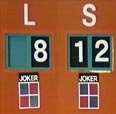 |
|
Schliersee
qualified for Jeux Sans Frontières at Marina di Carrara, Italy:
staged on Wednesday 1st June 1977 |
|
Additional Information |
|
After last year’s return to the normal process, this year’s allocation of the
West German teams to the International series was somewhat of a convoluted
affair and, like most other years, was again split into two distinct halves.
The winning teams from the first three heats were allocated their
Internationals based upon their winning margins from their opponents. The team
with the least difference was allocated to International Heat 1, and the team
with the greatest difference allocated to International Heat 3. International
Heat 4 had been reserved for the host team (being the winner of the fourth
Domestic heat) and the final International Heat for the losing team with the
highest score. The remaining two International Heats, 5 and 6, were also
allocated to the teams based on their winning margins, but in the reverse
order to the above. This resulted in the team with the greatest winning margin
being allocated to International Heat 5 and the one with the least allocated
to International Heat 6! Still with us? |
|
Made
in Colour • This
programme exists in German archives |
|
|
|
D |
Spiel Ohne Grenzen 1977 |
Heat 2 |
|
Event Staged: Saturday 23rd April 1977
Venue:
Marktplatz (Market Square), Schwäbisch Gmünd,
Baden-Württemberg, West Germany
Transmission:
WDR 1 (D): Saturday 23rd April 1977, 3.15-4.30pm (Live) |
|
Teams:
Schwäbisch Gmünd v. Tettnang |
|
Game
Results and Standings |
|
Result |
Team |
Points |
Final Scoreboard |
|
1st
2nd |
S
• Schwäbisch
Gmünd ●
●
T • Tettnang |
15
7 |
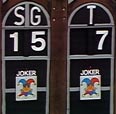 |
|
Schwäbisch Gmünd qualified for Jeux Sans Frontières at
Carouge, Switzerland:
staged on Wednesday 29th June 1977 |
|
Made
in Colour • This
programme exists in German archives |
|
|
|
D |
Spiel Ohne Grenzen 1977 |
Heat 3 |
|
Event Staged: Saturday 30th April 1977
Venue:
Dahner Felsenland (Dahn Rockland), Pfälzerwald (Palatinate Forest),
Dahn,
Rheinland-Pfalz, West Germany
Transmission:
WDR 1 (D): Saturday 30th April 1977, 2.55-4.10pm (Live)
Weather Conditions: Sunny and Warm |
|
Theme: The
Wild West |
|
Teams:
Dahn v. Ladenburg |
|
Team Members
included:
Dahn - Ria Burkhart, Cristine Kissel, Gerhard Kissel, A. Stoffel. |
|
Games: The
Five Wigwams, The Initiation Tests, The Mustang’s Watering Hole, The Bison
Hunt, Bags of Gold, Cowboys v. Indians, The Totem Poles, Log Floats, The
Eagle’s Eggs, Constructing the Totem Poles;
Zwischen-Spiel: The Monkey’s Bananas. |
|
Game Results and Standings |
|
Games |
| |
1 |
2 |
3 |
4 |
5 |
6 |
7 |
8 |
9 |
10 |
Points Scored
(Joker Games shown in red) |
|
D |
2 |
2 |
4 |
0 |
1 |
2 |
1 |
2 |
0 |
0 |
|
L |
0 |
0 |
0 |
2 |
1 |
0 |
1 |
0 |
2 |
2 |
Running Totals
(Leading teams shown in red) |
|
D |
2 |
4 |
8 |
8 |
9 |
11 |
12 |
14 |
14 |
14 |
|
L |
0 |
0 |
0 |
2 |
3 |
3 |
4 |
4 |
6 |
8 |
|
|
|
Result |
Team |
Points |
Final Scoreboard |
|
1st
2nd |
D
• Dahn ●
●
L • Ladenburg |
14
8 |
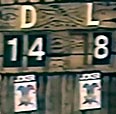 |
|
Dahn qualified for Jeux Sans Frontières at Évry, France:
staged on Wednesday 15th June 1977 |
|
The Host Town |
|
Dahn, West Germany
Dahn is a city and municipality in the Südwestpfalz district of the German
state of Rhineland-Palatinate. It is situated approximately 15km (9¼mi)
south-east of Pirmasens, 25km (15½mi) west of Landau and the border with
Alsace (France) is located just 10km (6¼mi) to the south.
The town was first mentioned as "Thanne" in 1148 and official documents show
that it originally belonged to the rule of the Knights of Dahn. After the
extinction of the Knight family in 1603, the area came under the jurisdiction
and ownership of the Bishopric of Speyer and later the Schenk von Waldenburg.
By the beginning of the 19th century, Dahn had already developed into a small
rural town with Verwaltungsfunktion (management functions).
The fir tree, known as Tanne in German, is assumed to be linked to the name of
the town and was originally the only symbol on its coat of arms. However, the
modern-day coat also shows a silver cross in the top-left corner denoting the
bishopric of Speyer and a white eagle with red background in the top right
hand corner denoting the knights of Than, whose coat of arms showed three
white eagles.
Dahn is the cultural and economic centre of the Dahn valley, and in 1963
received city status and state recognition and in 1973 the city was officially
recognised as a health resort.
|
|
The Venue |
|
Dahner Felsenland (Dahn
Rockland), Pfälzerwald (Palatinate Forest)
The games for this heat were played on a small clearing in the Dahner
Felsenland which is part of the Pfälzerwald, the largest forest in Germany.
The landscape covers almost the same area as the collective municipality of
the same name, which incorporates the town of Dahn and 14 villages. It is part
of the Palatine Forest Nature Park and lies between 200m (valleys) and 400m
(hilltops) high and is drained by the River Lauter, which here in its upper
reaches is called the Wieslauter, into the River Rhine. Within its boundaries
there are 16 medieval castles or castle ruins as well as numerous rock
formations made of buntsandstein (coloured sandstone), that are used by sport
climbers.
Old legends surround rocks like the Jungfernsprung (Virgin’s Jump) and the
Teufelstisch (the Devil's Table). The first recalls how once a young maiden
ventured into the Forest of Dahn to pick berries. When she was far away from
home, a man suddenly burst out of the thicket, probably the robber baron, Hans
Trapp from Berwartstein Castle. The man clearly intended to rob the virgin of
her innocence. So the young maiden gathered up her skirts and took to flight,
but the villain came ever closer to her. In her panic, the young lass failed
to watch where she was going. All of a sudden she found herself, panting for
breath, at the edge of the precipice with the houses of the town far below.
Without stopping to think, the young maiden fell over the abyss. And then the
miracle happened: because her skirts ballooned out and let her float down
gently, she survived the leap entirely unhurt. And ever since, at the spot
where her foot landed, a spring has flowed.
The latter story tells how once upon a time, the devil travelled through the
forest. In the evening, he became tired and hungry but, unfortunately, could
not find a place to sit down for dinner. Grabbing two big slices of rock, he
created his own table and chair. After finishing his meal, the devil
shouldered the chair to take it along for future rest stops, but he decided to
leave the table behind. The locals were shocked when they discovered it the
next day - and even to this day people come from miles away to see it. Despite
the legend, the rock formation was actually created by erosion through
millions of years with the ‘table’ being a big sandstone plate resting on two
narrow columns of rock. Weighing 300 tons and standing 14m (45ft 11¼in) high,
it is the most famous rock formation in the forest and was conquered for the
first time by a climber in 1922.
Felsenland may be reached via the B427 road which runs right through the Dahn
Valley (Dahner Tal), and running parallel to this in places is a branch of the
Queich Valley Railway (Pirmasens-Landau) called the Wieslauter Railway and
links the villages of Hinterweidenthal in the north and Bundenthal in the
south. The route was re-opened in 1997 for excursions on Sundays and holidays,
after regular passenger services had been terminated in 1966.
|
|
Additional Information |
|
At the time of recording, the venue for the International Heat in France was
scheduled to be Lyon in the south of the country. However, due to staging
difficulties, this venue was subsequently changed to Évry, located in the
north of the country, immediately south of Paris. |
|
Made
in Colour • This
programme exists in German archives |
|
|
|
D |
Spiel Ohne Grenzen 1977 |
Heat 4 |
|
Event Staged: Saturday 7th May 1977
Venue:
Park Hafen, Bernkastel-Kues, Rheinland-Pfalz, West Germany
Transmission:
WDR 1 (D): Saturday 7th May 1977, 3.15-4.30pm (Live) |
|
Teams:
Bernkastel-Kues v. Ludwigsburg |
|
Games included: Riding the Snail, The Grape Pickers and The Giant Tubs. |
|
Game
Results and Standings |
|
Result |
Team |
Points |
Final Scoreboard |
|
1st
2nd |
L • Ludwigsburg
●
●
B • Bernkastel-Kues |
17
3 |
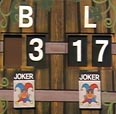 |
|
Ludwigsburg qualified for Jeux Sans Frontières at
Ludwigsburg, West Germany:
staged on Wednesday 13th July 1977 |
|
The Venue |
|
Bernkastel-Kues, West Germany
This heat was held on the small grassed area adjacent to the town’s harbour on
the banks of the river Mosel on which the town stands. Although originally two
separate communities, the new town came into being on 1st April 1905 when the
spa town of Bernkastel was merged with the winemaking village of Kues across
the river, but was still known as Bernkastel. In 1926, unrest amongst
winemakers along the Mosel resulted in the financial office in Bernkastel and
the customs office in Kues both being stormed and raided. It was not until
16th July 1936 that the southern side of the town was given official
recognition, when the town was renamed Bernkastel-Kues. On a hill overlooking
the town is the former Burg Landshut (Landshut Castle) which was built in the
13th century as a home for the bishops of Trier. In January 1692, a fire broke
out and left the castle in ruins. No reconstruction or restoration work was
ever instigated and it has remained in that condition ever since. |
|
Additional Information |
|
Both the teams in this Domestic Heat played their Jokers on games that they
ended up not winning. |
|
Made
in Colour • This
programme exists in German archives |
|
|
|
D |
Spiel Ohne Grenzen 1977 |
Heat 5 |
|
Event Staged: Saturday 14th May 1977
Venue:
Bebra, Hessen, West Germany
Transmission:
WDR 1 (D): Saturday 14th May 1977, 3.15-4.30pm (Live) |
|
Teams:
Bebra v. Limburg an der Lahn |
|
Game
Results and Standings |
|
Result |
Team |
Points |
Final Scoreboard |
|
1st
2nd |
B • Bebra ●
●
L • Limburg an der Lahn |
13
11 |
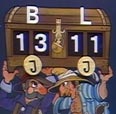 |
|
Bebra qualified for Jeux Sans Frontières at
Windsor, Great Britain:
staged on Tuesday 26th July 1977
Limburg an der Lahn qualified as the highest
scoring losing team for
Jeux Sans Frontières at Doetinchem, Netherlands:
staged on Wednesday 24th August 1977 |
|
Made
in Colour • This
programme exists in German archives |
|
|
|
D |
Spiel Ohne Grenzen 1977 |
Heat 6 |
|
Event Staged: Saturday 21st May 1977
Venue:
Seelze, Niedersachsen, West Germany
Transmission:
WDR 1 (D): Saturday 21st May 1977, 3.15-4.30pm (Live) |
|
Teams:
Ratingen v. Seelze |
|
Game
Results and Standings |
|
Result |
Team |
Points |
Final Scoreboard |
|
1st
2nd |
S • Seelze ●
●
R • Ratingen |
11
10 |
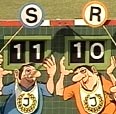 |
|
Seelze qualified for Jeux Sans Frontières at
Antwerpen, Belgium:
staged on Wednesday 10th August 1977 |
|
Additional Information |
|
This was the last Spiel Ohne Grenzen Domestic Heat to be held under
this format. From 1978 only two qualifying heats would be held with the top
three placed teams from each heat going through to the International series.
|
|
Made
in Colour • This
programme exists in German archives |
|
|
|
JSFnetGB Series Guide pages researched by
Neil Storer and
Alan Hayes
with Ischa Bijl, Julien Dessy, Sébastien Dias, David Hamilton, Denis Kirsanov, Paul Leaver, Philippe Minet,
Christos Moustakas, David Laich Ruiz, Marko Voštan and JSFnet Websites |
|
|